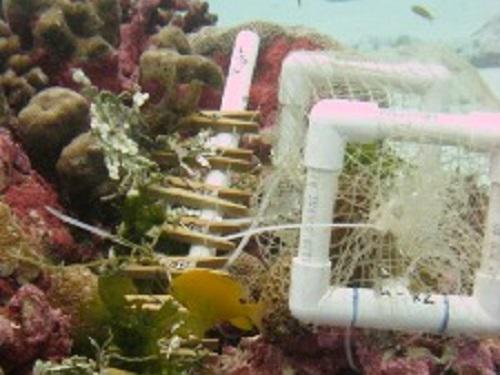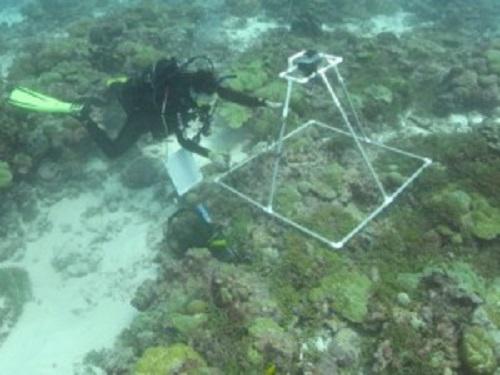Sheila Walsh & Julia Baum
We are establishing long-term coupled socioeconomic and ecological monitoring programs on Kiritimati, the world’s largest atoll, so that we may identify and develop win-win strategies for the conservation of Kiritimati’s reef fisheries and ecosystem.

Grazing experiment.
Kiritimati has a simple highly reef-dependent economy, a disturbance gradient (spanning from impacted reefs near the population centre to the world’s most pristine reefs at the remote southern end), and rapidly increasing human impacts resulting from a government resettlement program. These attributes provide a unique opportunity to evaluate an economic development policy and to identify and develop win-win strategies for both coral reef fisheries development and conservation.

Photoquad.
Our project explicitly integrates ecological and socioeconomic components, and thus will have greater predictive power, while also representing the sometimes conflicting and complementary goals of conservation and development.
We first aim to estimate initial ecological and human welfare impacts of Kiribati’s resettlement program by comparing temporal (2009 vs. 2007) and spatial (fishing gradient) changes using ecological and socioeconomic surveys. To meet these goals, we conducted an intensive field season in Kiritimati in July and August 2009 with a team of eight researchers, including ourselves, field assistants, and local translators. Together, we conducted underwater visual censuses of reef fish and benthos at over 30 sites (initially surveyed in 2007) covering the coastline and an extreme fishing gradient, established permanent mega-photoquadrats and coral settlement tiles at a subset of sites to monitor benthic dynamics, and conducted a grazing experiment to examine differences in herbivory rates across the fishing gradient. We also conducted socioeconomic surveys in all four villages on Kiritimati in order to understand spatial patterns of fishing, alternative economic activities, household capital, and demographics, and people’s opinions on the resource status, welfare, development and conservation options. We are working closely with the Ministry of Fisheries and local aquarium collectors and dive operators, and have publicized our work on Kiritimati radio. Over the next year, we will analyze these data and develop a coupled ecological-socioeconomic model that can serve as a decision tool, and will form the basis for long-term adaptive management planning.
We aim to continue socioeconomic and ecological monitoring in future field seasons, and to continue building relationships with Kiritimati stakeholders to facilitate implementation of conservation development policies.
We hope that this program will contribute substantially to nature conservation by evaluating sustainable development and conservation policies for some of the world’s last pristine coral reefs. The protocols and decision tools we develop for adaptive management in Kiritimati will be exportable to other coral reef sites, significantly expanding the impact of this program.